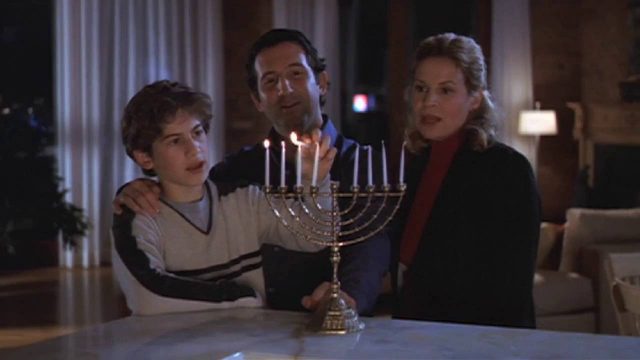The FAR has checked in on several topics this week and will fill you in on their status. Holiday movies: have limits! 2020 soundtracks: great! Indie films: foster relationships! Fake cartoonists: real funny! Spy novel fans: grieving! Videogame fans: not always great! If you require more details, please see below.
That’s to scb0212 and Miller for contributing and brightening every room they enter. Send articles throughout the next week to ploughmanplods [at] gmail, post articles from the past week below, have a Happy Friday!
At The AV Club, Will Feinstein breaks down why the meager Hanukkah movie options leave much to be desired – and why making a good one would be a difficult task:
It makes sense that Hanukkah’s American pop culture identity is as diluted as its religious identity. It now appears with its own colors and iconography like a bizzaro-world Christmas, itself commercialized and divorced from its own religious origins. Perhaps when Hallmark and Lifetime give Hanukkah a tacky Christmas treatment, it’s not totally off-base, because the American version of Hanukkah, while nice, is kind of tacky, too. But claiming these films are Hanukkah movies in their own right feels silly and occasionally offensive. Even if Hanukkah is depicted decently, like in the surprisingly palatable Double Holiday, the Christmas genre shouldn’t be the framework for how we understand a Jewish holiday.
For the Quietus, Charlie Brigden looks at the best soundtracks of the year:
Despite the film being essentially a relationship drama, Tamar-Kali’s score for the unique Shirley Jackson biopic ventures into the kind of eerie and unsettling atmosphere that Jackson created in her books. Using a small palette of strings and piano, Tamar-Kali imbues the music with dissonance that is often overbearing, pointedly so. Shirley feels like a score for a horror movie, with the plucked strings and off-kilter voices inciting a kind of frenzy that doesn’t resolve itself melodically until late in the album. It leaves you with a disconcerting feeling, like a wisp of smoke on the wind.
Patricia Vidal Delgado writes in Talkhouse about bonding over shared tragedy with her lead actress while making her debut feature La Leyenda Negra:
Monica, who had never acted before, auditioned for the role of Aleteia in early 2018. Looking back at the casting tapes, she told me that despite not being an immigrant herself, she was sympathetic to the plight of TPS-eligible teens who might have their immigration status revoked. […] She had family members who were undocumented and spoke of the constant fear of deportation: “Sometimes when we go certain places, we can’t take them, because maybe they’ll check their papers. As a family you just want to be with each other, but you’re scared, because you just want to go some place and have a good time, and you can’t.”
In the world of books, The New Yorker‘s Anthony Lane eulogizes spy novelist John le Carré:
His own father, famously, had been a confidence trickster, and le Carré was therefore all too well equipped to mount a lifelong investigation into the uses of roguery, not to mention sleights of hand, some of them amounting to a national disgrace. But let’s be honest; there are many authors who, consciously addressing themselves to matters of psychological intensity or grave historical concern, produce dull and ignorable books. What set le Carré apart, gave him his edge, and kept it whetted from one decade to the next was his forensic skill. Ideas and passions, under his guiding hand, are never floated; they are tethered down and incarnated in his characters—in their particular speech patterns, and in the inch-by-inch inflection of their movements. Le Carré is fluent in body language. He is no more at the mercy of the abstract than an oncologist, or a sushi chef.
In Slate, Nitish Pahwa interviews Ward Sutton, aka award-winning Onion cartoonist Stan Kelly, about sickos claiming Kelly’s Sicko as a meme:
“Even though it’s being used without the context of any specific full cartoon, I do really like that it’s utilized in the manner that Kelly intended it. The documentary about the cartoonist of Pepe the Frog, which was co-opted by the alt-right and completely changed—I would think, as a cartoonist, that would be really distressing. But in this case, I’m just delighted, the fact that this element in the cartoon grabbed people enough that they are now using it as their own expression.”
And finally, John Walker at Kotaku responds to the gaming world drama around Cyberpunk 2077, giving context to the past and present of video game criticism:
Of course, the far bigger issue is that a loud proportion of Cyberpunk 2077 purchasers (and indeed any other big-name game) don’t want reviews at all. They want reassurance. They paid for this game nearly two years ago, for whatever illogical reason (“I’m supporting the massive multi-million dollar company!”), for no gain, no extra content, no early access, no bonus items, and they want to know they did the right thing. And, for some, paying for a years-away game is just the start of the sort of self-imposed brainwashing that causes someone to switch from being A Person Who Pre-Ordered A Game They Want To Play to being A Fan. They’ve not only irrationally invested money, but since then have been investing their emotion. They’ve read everything they can find to read about it, hooked up to the PR drip-feed of information that comes both direct from the publisher and the compliant sites that report it all to their readers. This emotional investment mutates into a form of loyalty, a belief that they are now on the game’s side, and a slight against the game is now a slight against themselves.

